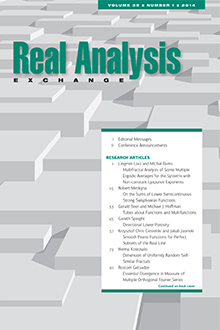Abstract
The system of functional differential equations (1) has a continuously differentiable solution for every value of the parameter $a$. The boundary values and $a$ are related with $d(2-a)=c(2+a)$. When $a\in S$ where $$S=\left\{ 2^{2n+1}:n=1,2,3,\ldots\right\},$$ the system (1) has infinitely many solutions with boundary values $c=0$ and $d=0$. For all other values of $a$, the system \eqref{equation1_1} has a unique solution. \begin{equation} \tag{$1$}\label{equation1_1} \left \{ \begin{array} {l l } F^{\prime}(x)=a F(2x) & \mathrm{ if} \: 0\leq x\leq \dfrac{1}{2} \\ F^{\prime}(x)=a F(2-2x) & \mathrm{ if} \: \dfrac{1}{2} \leq x\leq 1 \\ F(0)=c, F(1)=d. & \end{array} \right. \end{equation}
Citation
Yuri Dimitrov. G. A. Edgar. "Solutions of self-differential functional equations.." Real Anal. Exchange 32 (1) 29 - 54, 2006/2007.
Information





